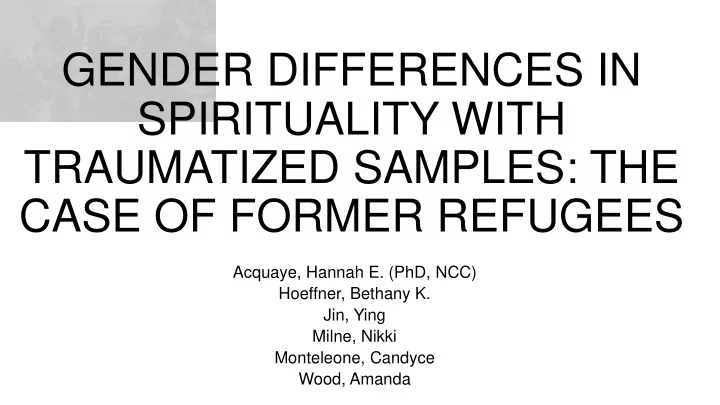

GENDER DIFFERENCES IN SPIRITUALITY WITH TRAUMATIZED SAMPLES: THE CASE OF FORMER REFUGEES Acquaye, Hannah E. (PhD, NCC) Hoeffner, Bethany K. Jin, Ying Milne, Nikki Monteleone, Candyce Wood, Amanda
AGENDA 1. Introduction 2. Literature 3. Method 4. Analyses 5. Results 6. Role Play 7. Discussion
INTRODUCTION • Counselors are increasingly concerned about refugee crises • Wars, terrorism, gang violence, persecution • Crises result in displacement, resettlement, legal challenges, and biopsychosocial stressors • Refugees encounter diverse stressors before, during, and after their traumatic experience • Hunger, fear, assault from rebels and wild animals • Have symptoms that meet diagnoses for PTSD • Despite these challenges, some also demonstrate abiding resilience and post-traumatic growth • Counselors need to understand their challenges and ability to grow using spirituality to effectively work with this diverse population.
LITERATURE • Trauma • Deeply distressing or disturbing experience • Wounds of war • Refugees and their experiences • Religiousness and/or spirituality in traumatized populations • Definition and differences • Assess clients’ spirituality and/or religiousness formally and informally • Many religiousness and/or spirituality instruments • Religious Commitment Inventory (RCI-10) • Not specific to one religious identity • A 10-item self-report measure; 2 factors (intrapersonal and interpersonal)
METHOD • Cross-sectional design • Criterion purposive sampling and snowball sampling • 18+ years • Must read and understand English at 8 th grade level • Must have been old enough during the war to remember the events • Was internally displaced and/or a refugee during the war period • 500 participants given package (88.8% response rate) • Data collected as part of dissertation • Local healers to address any mental health issues • For this presentation, we report just two of the instruments • Post-Traumatic Stress Disorder Checklist for DSM-5 (PCL-5) • Religious Commitment Inventory (RCI-10)
Participant demographics Prompt Frequency & (Percentage) Gender: Male 288 (72.0%) Female 111 (27.8%) Displacement: No follow up to protect No 46 (11.5%) former child soldiers who Yes 353 (88.3%) may not have been displaced Displacement status: IDP 243 (60.8%) Refugee 135 (30.4%)
Prompt Frequency & (Percentage) Self-report religiousness No 2( 0.5%) Yes 400(90.1%) Religious Affiliation: African Traditionalist 1 (0.3%) Christian 373 (93.3%) Muslim 26 (6.5%) Participant Frequency of involvement: demographics Never 2 (0.5%) 1 or 2 times a year 30 (7.5%) Once every month 48 (12.0%) 1 or more times a week 317 (79.3%) PTSD diagnosis: No PTSD 86 (21.5%) PTSD present 236 (59.0%
RESULTS • Gender differences in spirituality: • Independent samples t-test • Statistically significant mean differences in spirituality between gender t (385) = -3.684; p ≤ .001 • Females had higher mean score ( M = 41.33; sd = 6.53; n = 109) than males ( M = 38.45; sd = 7.06; n = 278) • Gender differences in trauma: • Independent samples t-test • No statistically significant difference in trauma between gender
USING SPIRITUAL ASSESSMENT IN SESSION
DISCUSSION • For this group, there were no differences in trauma scores • Previous research studies have documented major differences in trauma scores between gender • There were significant differences in spirituality scores • Counselors in assessing clients’ religiousness/spirituality, have to factor in some gender differences • Implication for gender differences are important for group workers as they can target specific groups for spiritually-focused group work • Results of previous research have demonstrated the ability of faith/religiousness/spirituality to enhance healing and growth beyond a traumatic event
Discussion continued • There are various ways of undertaking spiritual assessment as seen in the role play • Counselors can choose the formal or informal assessments, and combined with empathy and unconditional positive regard, come alongside clients to assess how their previous religious beliefs have enhanced psychological growth • As counselors, we need self-awareness of our own religiousness/spirituality or lack thereof to create the therapeutic space for clients to process their spirituality journey as it enhances or diminishes their psychological healing process
Questions 1. How has the experience of working with clients who have been traumatized been for you, in terms of assessing how spirituality affects their healing process? 2. What is your level of comfort or discomfort? 3. Is there any other thing you want to share with all of us that we have not yet addressed?
Recommend
More recommend